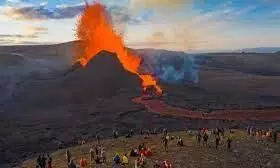
Iceland hit with 800 earthquakes in 14 hours, declares emergency
text_fieldsReykjavík: Iceland has declared a state of emergency in response to a series of powerful earthquakes on the Reykjanes peninsula, prompting concerns about a potential volcanic eruption. Around 800 earthquakes were reported in just 14 hours.
The Department of Civil Protection and Emergency Management stated that the intense seismic activity at Sundhnjukagigar, north of Grindavik, led to the declaration of a state of emergency for civil defence, reported AFP.
"The National police chief declares a state of emergency for civil defence due to the intense earthquake (activity) at Sundhnjukagigar, north of Grindavik," the statement read. It further cautioned that earthquakes could escalate in magnitude, possibly indicating an impending eruption.
The Icelandic Met Office (IMO) suggested that an eruption might occur "in several days." Grindavik, home to around 4,000 people, is located in close proximity to the earthquake swarm's epicentre, with evacuation plans in place should an eruption occur.
Two significant earthquakes, with a magnitude of 5.2, were felt as far as Reykjavik, 40 kilometres away, and along much of the country's southern coast. The seismic activity caused damage to roads, leading to the closure of a north-south route to Grindavik.
The IMO reported approximately 24,000 tremors on the peninsula since late October, with nearly 800 earthquakes recorded in a dense swarm between midnight and 1400 GMT on Friday. The accumulation of magma underground at a depth of about five kilometres raised concerns about a potential volcanic eruption.
"The most likely scenario is that it will take several days rather than hours for magma to reach the surface," the IMO stated. While the seismic activity is concentrated in a high-risk area, lava flow, if it occurs, is not expected to reach Grindavik.
As a precautionary measure, the patrol vessel Thor is being sent to Grindavik for security purposes. Emergency shelters and assistance centres have opened in Grindavik and three other locations in southern Iceland.
The Blue Lagoon, a popular tourist destination near Grindavik, closed as a precaution following another earthquake swarm. The Svartsengi geothermal plant, a key supplier of electricity and water to the region, has contingency plans in place for worker and plant protection in the event of an eruption.
Iceland, known for its volcanic activity, has 33 active volcanic systems, making it the highest number in Europe.
The Reykjanes peninsula witnessed eruptions in March 2021, August 2022, and July 2023, all located away from populated areas. The current seismic events mark an increase in volcanic activity, potentially lasting for several decades or centuries.
Iceland's unique geological position straddles the Mid-Atlantic Ridge, a tectonic plate boundary.
In the context of volcanic disruptions, the mention was made of the Eyjafjallajokull eruption in April 2010, causing significant flight cancellations and stranding over 10 million travellers.























